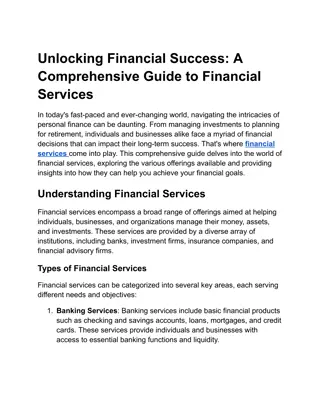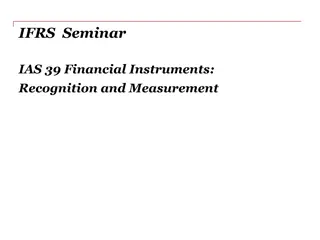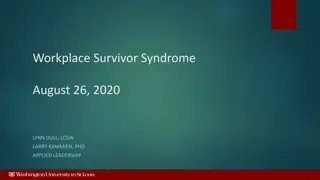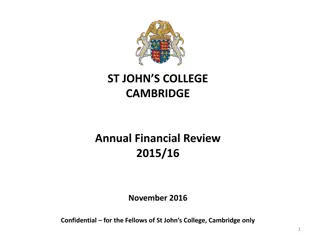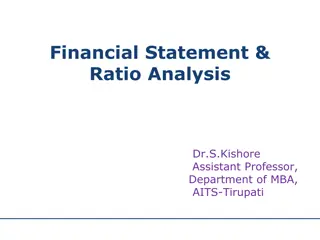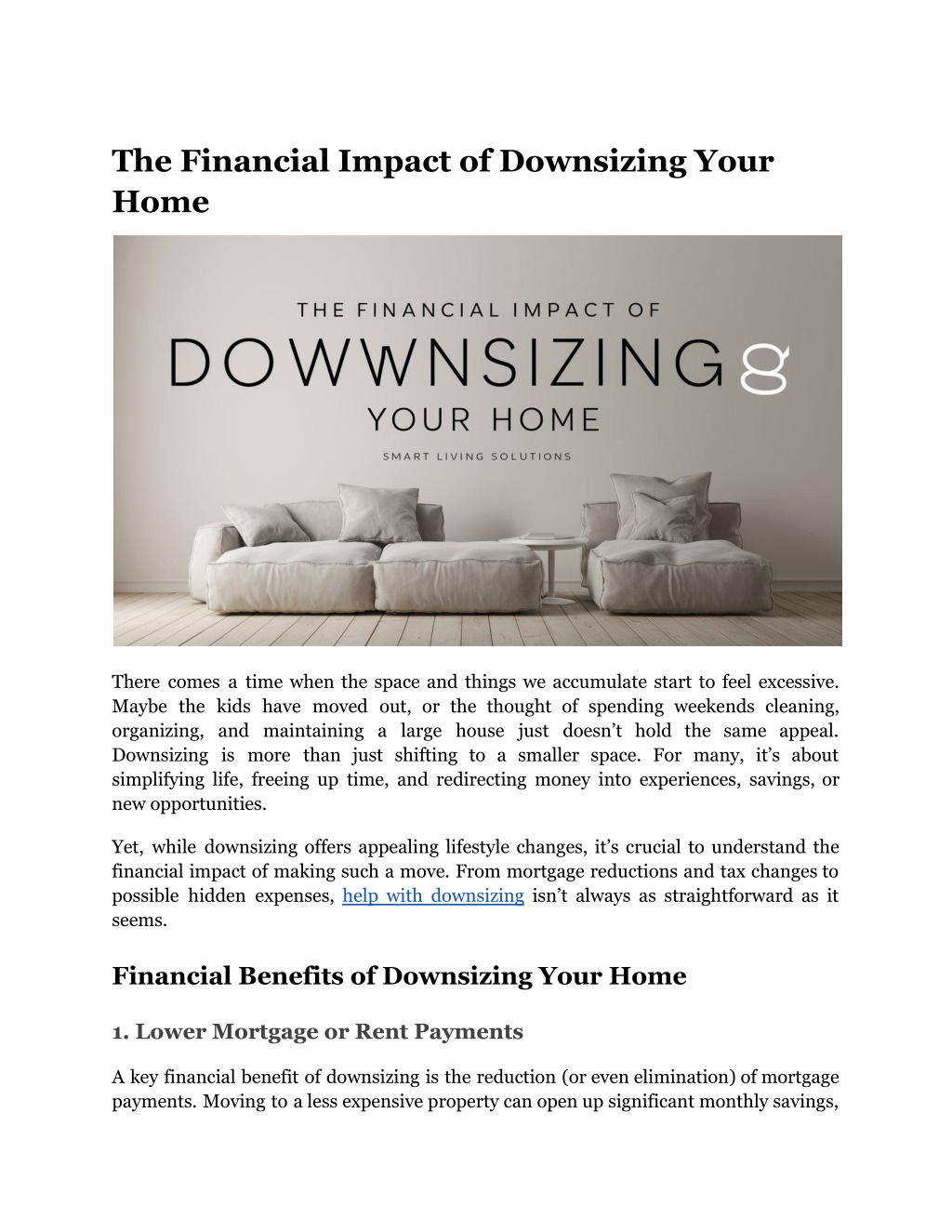
The Financial Impact of Downsizing Your Home
Discover how downsizing your home can save money and reduce expenses, offering long-term financial freedom and peace of mind.n
Download Presentation

Please find below an Image/Link to download the presentation.
The content on the website is provided AS IS for your information and personal use only. It may not be sold, licensed, or shared on other websites without obtaining consent from the author. Download presentation by click this link. If you encounter any issues during the download, it is possible that the publisher has removed the file from their server.
E N D
Presentation Transcript
The Financial Impact of Downsizing Your Home There comes a time when the space and things we accumulate start to feel excessive. Maybe the kids have moved out, or the thought of spending weekends cleaning, organizing, and maintaining a large house just doesn t hold the same appeal. Downsizing is more than just shifting to a smaller space. For many, it s about simplifying life, freeing up time, and redirecting money into experiences, savings, or new opportunities. Yet, while downsizing offers appealing lifestyle changes, it s crucial to understand the financial impact of making such a move. From mortgage reductions and tax changes to possible hidden expenses, help with downsizing isn t always as straightforward as it seems. Financial Benefits of Downsizing Your Home 1. Lower Mortgage or Rent Payments A key financial benefit of downsizing is the reduction (or even elimination) of mortgage payments. Moving to a less expensive property can open up significant monthly savings,
especially if youre downsizing from a large family home to a smaller residence or a rental. Mortgage Savings: By downsizing to a more affordable property, you can reduce your loan size, resulting in lower monthly payments or freeing up equity for other investments. Interest Reduction: A smaller loan also means less interest paid over time, increasing your long-term savings. Possibility of Renting: Some homeowners prefer renting after downsizing, allowing them to avoid mortgage and property taxes altogether. 2. Reduced Property Taxes and Insurance Premiums Property taxes are based on your home s assessed value, which typically decreases when you downsize. Moving to a smaller, less valuable home means lower taxes, especially if you relocate to an area with lower tax rates. Similarly, downsizing often results in reduced insurance premiums since smaller or lower-valued homes cost less to insure. Financial Aspect Potential Savings Explanation Property Taxes Up lower to 30-40% Based on the reduced assessed value of the new home Homeowners Insurance 15-25% reduction Depends on home size, age, and location 3. Lower Utility Costs Utility expenses tend to decrease significantly when downsizing, especially if you re moving from a large house to a more compact, energy-efficient space. A smaller home is easier to heat, cool, and maintain, which can drastically reduce monthly utility costs. Heating and Cooling: With fewer square feet to control, heating and cooling costs drop. Water and Electricity: Smaller spaces mean fewer lights, less water use, and lower electrical needs. Energy-Efficient Upgrades: Many downsized homes or condos come with energy-saving features like insulated windows or solar power, further reducing utility expenses.
4. Release of Home Equity For those who have owned their home for years, downsizing can free up a substantial amount of home equity. Selling a larger home for a smaller one can give you capital to invest in other areas, bolster your retirement fund, or even fund travel or hobbies you ve been looking forward to pursuing. Equity Access: Downsizing allows you to access the equity built in your previous home and repurpose it for new goals. Capital Gains Exemption: Homeowners may be able to exclude up to $250,000 (or $500,000 if married filing jointly) from the gain from taxable income if they meet certain conditions. 5. Reduced Maintenance and Repair Expenses A large home often comes with high maintenance costs from lawn care to appliance repairs to roof upkeep. Moving to a smaller home, especially a condo or townhouse, can reduce these ongoing maintenance expenses. Some maintenance may even be covered by condo or HOA fees, depending on the property. Fewer Repairs and Upkeep: Fewer rooms and appliances mean fewer repair costs. Lawn and Garden Savings: For those moving from a house to a condo or a home with minimal landscaping, downsizing can eliminate or drastically reduce lawn care costs. HOA and Condo Services: Some smaller living arrangements offer maintenance services included in HOA fees, such as snow removal, lawn care, or exterior repairs. Downsizing Costs and Considerations While downsizing offers significant financial benefits, the process also comes with some potential expenses and adjustments to be mindful of. 1. Selling and Moving Costs Downsizing isn t free. Selling a home involves realtor commissions, staging costs, possible repairs, and, of course, the cost of physically moving from one home to another. Realtor Fees: Typically around 5-6% of your home s sale price, this is one of the largest selling expenses.
Staging and Home Improvements: Minor repairs or home updates might be necessary to get your home market-ready. Moving Expenses: Hiring a moving company or renting a truck, especially if moving long-distance, can add up. 2. Buying and Closing Costs on a New Home Buying a new home, even a smaller one, means paying closing costs, which include various fees like loan origination, appraisal, and inspection costs. Additionally, you may encounter unexpected expenses when settling into a new home. Cost Type Average Cost Notes Realtor Commission 5-6% of sale price Based on selling your previous home Closing Costs 2-5% of purchase price Includes loan, inspection, and appraisal fees Moving Expenses $1,000 - $5,000+ Varies based on move distance and amount of belongings 3. HOA Fees or Community Costs Moving to a smaller home often means choosing condos, townhouses, or communities with HOA fees, which can be a monthly or annual cost covering amenities or maintenance. These fees vary widely and can impact your overall budget, so it s essential to factor them in before downsizing. Monthly HOA Dues: Cover costs for common area maintenance, landscaping, and community facilities. Special Assessments: Occasionally, HOAs may charge additional fees for large repairs or upgrades to community property. 4. Emotional Impact and Lifestyle Adjustment Downsizing means adjusting to less space, which may require rethinking how you live and what you need. For some, moving into a smaller home can be an emotional shift, especially when it involves letting go of sentimental items or adjusting to a new lifestyle.
How to Decide if Downsizing is Right for You Downsizing can offer financial benefits, but it isn t always the right choice for everyone. Consider the following factors to determine if they align with your personal and financial goals. 1. Assess Your Space and Lifestyle Needs Think about how you use your current space. Downsizing may require letting go of extra rooms, storage areas, and certain amenities. Family Size: If you still have family members living with you or expect frequent visitors, consider if a smaller home can comfortably accommodate everyone. Lifestyle Needs: If you host events or frequently entertain guests, assess whether you ll be able to continue those activities in a smaller space. 2. Calculate Potential Savings and Costs Get a clear picture of the financial impact by comparing your current costs with projected expenses for your downsized home. Financial Aspect Current Home Downsized Home Monthly Payment Mortgage $2,000 $1,200 Property Taxes $5,000 annually $2,800 annually Homeowners Insurance $1,500 annually $1,000 annually Utility Costs & Maintenance $4,200 annually $2,000 annually HOA Fees (if applicable) $0 $300 monthly 3. Consider Long-Term Goals Downsizing isn t just about short-term savings; it s about aligning your home with your long-term vision. If you re looking to simplify life, travel more, or live closer to family, downsizing may be a great fit.
4. Reinvesting Equity for Future Financial Growth If downsizing allows you to access home equity, consider how you could invest those funds. For some, the additional capital can create opportunities for boosting retirement funds, investing in the stock market, or even exploring new business ventures. Practical Tips for a Smooth Transition Downsizing can feel overwhelming, but planning and the right strategies can make it much smoother. Here are some practical steps to consider to help with downsizing: Start Early with Decluttering: Begin by sorting through each room, deciding which items you ll keep, sell, donate, or discard. Consider Short-Term Storage: If you re not ready to let go of certain items, renting a temporary storage unit can ease the transition. Get Professional Assistance: Downsizing experts, real estate agents, or financial advisors can provide guidance tailored to your needs and help you understand the market better. Conclusion Downsizing is a chance to reduce costs, increase financial flexibility, and embrace a lifestyle that matches your current needs and future goals. It can lead to considerable savings on everything from property taxes to utilities, while also freeing up equity for new investments or experiences. However, it s essential to consider the costs involved in selling, buying, and adjusting to a smaller space to ensure the financial benefits align with your expectations. Site Article: The Financial Impact of Downsizing Your Home






